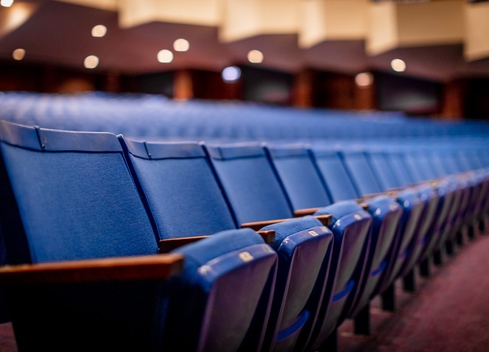
Next time you have to go to a ceremony or performance at Millikin, be sure you chug water beforehand—otherwise, you’ll be condemned to dehydration.
Millikin’s annual Honors Convocation recognizes students and faculty for professional and academic achievement. This year’s convocation was on Thursday, April 24 at the Kirkland Fine Arts Center. I was one of many students in attendance.
I have a chronic illness that requires me to stay very hydrated, so I bring my water bottle with me everywhere. Apparently, my water bottle was a problem at KFAC. I was stopped not once, not twice, but three times to be told I wasn’t allowed to have any water in the theater.
“I have a medical reason to have water with me,” I said.
One student worker accepted this without question. The other continued to question me about whether her boss had granted permission for (what I was quickly learning to be) such an appalling object. I assured her that he had, and she let me continue.
But the permission in question was granted very begrudgingly. When I went to enter the KFAC theater space, the Director of Kirkland Fine Arts Center stopped me by physically stepping in front of my path.
“You can’t bring water bottles in there,” he said.
“I have a medical reason for bringing my water bottle. Is that OK?” I asked.
Cue one of the biggest eye rolls I have ever seen.
I wasn’t surprised by the blatant disrespect on this man’s face. It’s not the first time I’ve faced that kind of skepticism when asking for disability accommodations—it’s not even the first time I’ve faced that kind of response from this particular faculty member. So, I wasn’t surprised, but it still upset me.
I wanted to tell him if I didn’t have my water, I might faint while I was standing and waiting to walk across the stage and accept my awards. I wanted to ask him what made him feel so emboldened as to question my specific medical needs. I wanted to scream that I shouldn’t have to defend myself over something as simple as having a water bottle at a university event.
Living with an invisible disability is frustrating that way. Many people don’t believe you when you say you need something, or they suspect you’re exaggerating.
And maybe this has sounded melodramatic to you so far. Maybe you’ve been thinking, “OK… so some guy rolled his eyes at you. What’s the big deal?”
And alright, sure. Maybe it is a bit melodramatic. I mean, it’s not as if denying someone water is a life-or-death issue… right?
Wrong.
Back in November, a 23-year-old woman died of heatstroke at a Taylor Swift concert in Brazil after the venue denied audience members the ability to bring their own water. Her case isn’t the first of its kind, and it likely won’t be the last.
So why do venues deny patrons this basic human need? There are a couple of reasons. Firstly, they don’t want people smuggling in alcohol. Secondly, they want to make money off of people needing to buy water at the venues. But this becomes a problem when accessibility to water inside the venue isn’t guaranteed.
Many concertgoers alleged the Brazilian Stadium didn’t supply enough water for the more than 60,000 attendees. This supply problem isn’t uncommon.
At Millikin, there is no sale of water inside any of the theaters. Audience members can’t purchase water inside, so the theaters are effectively prohibiting people from having water at all. Even if I had wanted to comply with Millikin’s request, doing so while still accommodating my disability would have been impossible.
Granted, not having water for a couple hours at an indoor event wouldn’t mean the difference between life and death for me. But it would impact my comfort and safety. Something shouldn’t have to be life-threatening to still be a right.
Millikin hasn’t always been this way, either. I used to bring my water bottle everywhere, no questions asked. No one gave me dirty looks for trying to keep myself hydrated.
But something has changed, apparently. Water is no longer acceptable. I have to ask… why? Do they really think that I’m going to be smuggling in clear vodka at 7:00 p.m. on a Thursday night?
Shaming students for having water bottles at university events isn’t just weird. It’s harmful. Maybe instead of creating new rules that disproportionately affect disabled students, Millikin should be making sure students can enjoy the programming we pay to attend.

